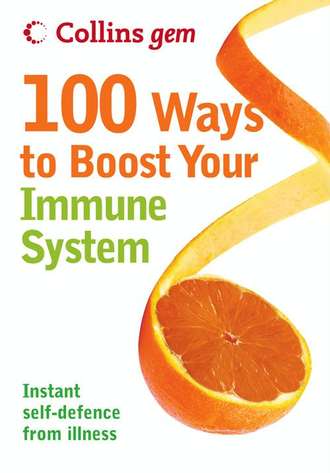
Полная версия
100 Ways to Boost Your Immune System
making the right diet and lifestyle choices.
Vaccination
Your doctor can help you stay healthy by offering you appropriate vaccinations to reduce your risk of getting infected with diseases that are potentially life-threatening. Many vaccines are given in childhood, but adults can also be vaccinated to prevent illness such as tetanus and influenza.
Your body can become immune to bacteria, viruses and other germs by getting a disease – this is called natural immunity. Immunity can also be developed through vaccines – vaccine-induced immunity. Vaccines work by stimulating an immune response without causing disease. Several doses of a vaccine may be needed for a full immune response and it should be noted that vaccines are not free of possible side effects, which often include swelling at the injection site or a mild fever.
Vaccines are the first line of defence against diseases such as polio, measles, tetanus, mumps, rubella, influenza and diphtheria. Were it not for the widespread use of vaccines, a far greater number of deaths would have occurred in childhood, and a great many more people would be living with the chronic and crippling after-effects of disease.
Despite the proven benefits of vaccines there is public concern about their safety and possible side effects, but vaccination continues to be strongly recommended by doctors because gaining natural immunity involves considerable risk.
Vaccination is generally considered by health experts to be the right thing to do as it protects you as well as others. If you have any concerns about vaccinations for which you or your child are eligible, however, it is important to discuss them with your doctor before you come to an informed decision. You can also look at the following website: www.immunisation.nhs.uk. This is an up-to-date source of information on vaccines, disease and immunisation in the UK. Whatever you decide, remember that the overwhelming majority of evidence and research suggests that vaccinations save lives.
The flu jab
Catching flu is tough for most people but for some, especially the elderly, it can lead to serious illnesses such as bronchitis and pneumonia that may lead to hospital treatment and – in severe cases – death. That’s why doctors advise all people over the age of 65, and those with long-term medical conditions, to have a yearly flu vaccination.
The best time to have a flu jab is between late September and early November, to prepare for the winter months. The flu virus mutates frequently, which is why yearly jabs are advised to guarantee protection against the latest strain of the virus. If you think you need a flu vaccination, check with your doctor or ask your local pharmacist for advice. Bear in mind that it takes between seven and ten days for the vaccine to take effect, and that the flu jab doesn’t stop you catching the many other viruses that appear every winter.
Immunity enemies
Although compromised immunity can be triggered by accidents and medication (or in rare cases, immuno-deficiency disease viruses such as HIV), the most common causes of below-par immunity are in fact related to diet and lifestyle choices. In other words, the strength of your immune system is strongly influenced by factors within your control.
A healthy immune system forms the basis of your well-being, so making it more efficient by avoiding anything that might compromise or weaken it is fundamental to good health. Listed below are factors that clinical experience and modern research have shown to have the most damaging influence on immunity, and which should be avoided to ensure good health.
Nutritional deficiencies: The immune system works best when you keep it supplied with a full range of micronutrients such as vitamins and minerals. A poor diet increases the likelihood of nutritional deficiencies and therefore weakens immunity. (For advice on optimising your immunity through diet choices, see ‘Part Two: Boosting immunity with nutrition’.)
Stress: Chronic stress causes the adrenal glands to secrete higher levels of corticosteroids, which depress immune function. (For advice on boosting your immunity through stress management, see ‘Part Two: Boosting immunity with lifestyle changes’.)
Depression: Research shows that people who are negative, moody, nervous and easily stressed have a weaker immune response than those who are more positive. (For advice on boosting your immunity with a positive attitude, see ‘Part Two: Boosting immunity with a Fighting spirit’.)
Lack of quality sleep: Lack of sleep seems to impair the healthy functioning of the immune system. (For advice on getting a good night’s sleep, see ‘Part Two, pages 92–93’.)
Sedentary lifestyle: Exercise enhances the overall functioning of the immune system, and protects against heart disease, cancer and osteoporosis, as well as being an effective way to relieve stress. Research has shown that people who exercise regularly are less likely to get colds than those who are not active. (For advice on immune boosting and exercise, see ‘Part Two, pages 94–95’.)
Over-exertion: Too much exercise can be as damaging as too little. Over-exertion suppresses T-cell function and other immune responses. (For advice on boosting immunity with a regular, moderate exercise plan, see ‘Part Two, pages 94–101’.)
Weight gain: Obesity increases the risk of cancer and heart disease, so maintaining a healthy body weight is a sensible way to encourage long-term immune health, as well as general well-being. (For advice on boosting immunity through weight management, see ‘Part Two, pages 102–103’.)
Alcohol, cigarettes and drugs: Alcohol in excess, together with smoking and taking recreational drugs are simply not compatible with a healthy immune system. The odd drink now and again is fine, but more than one drink a day depresses the immune system; drug use is a major cause of poor nutrition, which damages immunity further; and cigarette smoke contains high levels of dangerous chemicals, including cadmium, which is a powerful immune system depressant. (For advice on quitting smoking, see ‘Part Two, page 126’.)
Over-use of antibiotics: Over-use of antibiotics can cause unintentional suppression of normal immune system responses. (For advice on the sensible use of antibiotics, see ‘Part Three: Fighting Infection’.)
Environmental pollutants: All of the following three categories can compromise immunity and although it is impossible to avoid them completely, sensible use and taking the recommended precautions are advised.
Radiation: From mobile phones, televisions, microwaves, radio transmitters and computers.
Chemicals: From engine exhaust fumes, pesticides, herbicides, smoke, aerosols, paints and household products such as air fresheners, cosmetics, deoderants, detergents and furniture polish. Food additives, preservatives and colourings also fall into this category.
Biological: From house dust, dust mites and mould.
(For advice on avoiding environmental pollutants that can compromise immunity, see ‘Part Two, pages 146-167’.)
Is your immune system in trouble?
The earlier you recognise the signs and symptoms of weakened immunity, the faster you can take corrective action and decrease your risk of illness or poor health. Your immune system may be invisible but there are ways to tell if it is in trouble. Use the checklist below to see if your immune system is in need of a boost.
Do you feel as if you have lost your energy or get-up-and-go?
Do you feel the cold more than other people?
Do you get more than two or three colds a year?
Have you noticed a loss of libido?
Are you overweight?
Do you smoke?
Is your job sedentary?
Do you spend little time in natural sunlight?
Is your diet high in sugar and refined processed foods?
Do you feel stressed, up and down or just below par?
Are you forgetful?
Is it ages since you had a good night’s sleep?
Do you need coffee or other stimulants to get you through the day?
Is your skin dry or dull?
Do you suffer from indigestion, constipation or bouts of diarrhoea?
Is your neck stiff and sore when you move?
Does your breath smell?
Do you suffer from bleeding gums?
Do you suffer from eye strain?
Do you suffer from frequent headaches?
Can you sometimes hear high-pitched sounds in your ears?
Do you suffer from allergies?
Do you get food cravings or feelings of intense hunger?
Are you prone to thrush or cystitis?
Do your cuts or wounds heal slowly?
Do you suffer from anaemia?
Does your hair lack shine?
Do you often feel fed-up and run down?
If you ticked more than 5 boxes and you can’t find any logical explanation (for example, a stiff neck is to be expected if you slept in a draught; hunger is normal if you haven’t eaten for a few hours and so on), your immune system is definitely in need of a boost. Follow as much of the advice as you can in ‘Part Two: 100 Immune System Boosters’.
If you answered ‘yes’ to only a few questions, your immune system is doing its job well, but it’s still worthwhile reviewing ‘Part Two’ to find ways to turn any ‘yes’ answers you gave into ‘no’ answers.
Making immune-boosting diet and lifestyle choices
Danger comes when your immune system is weakened, and invaders remain undetected and start to multiply. Some invaders are so powerful that they trample your body’s immune system, but in the great majority of cases research has shown that making the right diet and lifestyle choices is the most effective way to boost your immunity and protect your health.
Although vaccinations are a good insurance policy against disease, and medications can save lives, the first line of defence against unpleasant illnesses – such as colds and influenza – is to make sure your immune system is as strong and healthy as possible. The 100 immune-system boosters that follow will give you all the information you need to keep your body’s defences strong through informed diet and lifestyle choices. And whether you decide to incorporate one or all 100 boosters into your life, bear in mind that each one is designed not only to keep you as free from illness as possible, but to also help you feel great, look better and live longer.
Boosting immunity with nutrition
1 Go Mediterranean
If you keep your body well nourished with a healthy, balanced diet, you can literally ‘eat yourself well’.
Nutrients are needed for every part of your immune system, and for renewal, repair and defence against infection and illness, so its strength will depend on the quality of your diet. It is therefore important to maintain a healthy, balanced diet that provides an adequate intake of vitamins, minerals and dietary fibre.
But what is a healthy, balanced diet? Studies have shown that the so-called ‘Mediterranean diet’ can offer protection against obesity, heart disease, osteoporosis, cancer and diabetes.
The Mediterranean diet is rich in fruits, vegetables and wholegrains, and contains adequate amounts of oily fish, nuts, seeds, legumes, diary products, lean meat or meat substitutes. Saturated fat, salt and sugar intake are limited, and processed, refined foods are off the menu entirely. Olive oil, the primary source of fat in the Mediterranean diet, is an excellent source of monounsaturated fatty acids that help to lower cholesterol. It is also rich in vitamins and antioxidants that fight cancer and lower the risk of developing degenerative diseases.
In a nutshell, research suggests that the Mediterranean diet, with its emphasis on a wide variety of fresh whole foods – along with the odd glass of antioxidant-rich red wine – is the template for a healthy immune-boosting diet.
2 Double take
The nutritional benefit that you receive from fruits and vegetables is unparalleled. Experts advise eating five to nine servings of fruits and vegetables per day; one way to maximise the variety of immune-boosting vitamins, minerals, fibre and antioxidants, is to make sure you eat two different colours of vegetables and fruits with each meal.
Each different-coloured fruit and vegetable contains unique health components that are essential to our health. The phrase ‘eating a rainbow of fruits and vegetables’ is a simple way of remembering to get as much colour variety in your diet as possible, so that you can maximise your intake of a broad range of nutrients.
Red: Tomatoes, berries, peppers and radishes contain nutrients that can reduce the risk of prostate cancer, lower blood pressure, reduce tumour growth and cholesterol levels, eliminate harmful free radicals, and support joint tissue in arthritis cases.
Orange and yellow: Carrots, yams, squash, oranges, papayas and other orange and yellow fruits and vegetables contain nutrients that can reduce age-related macular degeneration and the risk of prostate cancer, lower cholesterol and blood pressure, promote collagen formation and healthy joints, fight harmful free radicals and work with magnesium and calcium to build healthy bones.
White: Mushrooms, pak choi and pumpkins contain nutrients that can activate natural killer B and T cells, reduce the risk of colon, breast and prostate cancers, and balance hormone levels, reducing the risk of hormone-related cancers.
Green: Kale, spinach, cabbage, alfalfa sprouts, mustard greens and collard greens are all examples of green vegetables that contain nutrients that can reduce cancer risk, lower blood pressure and cholesterol levels, boost digestion, support retinal health and vision, fight harmful free radicals, and boost immune system activity.
Blue and purple: Blueberries, pomegranates, grapes, elderberries, aubergines and prunes contain nutrients that boost healthy digestion and act as anti-carcinogens in the digestive tract.
3 Drink your lemons
Drinking a glass of lemon juice diluted with filtered water every morning is the perfect way to kick-start your digestion and boost your immunity at the same time.
Lemons contain bioflavonoids, a group of nutrients that boosts immunity by protecting the cells of your body against environmental pollutants. Along the membrane of each cell there are microscopic parking spaces, called receptor sites. Pollutants, toxins or germs can park here and gradually eat their way into the membrane of the cell, but when bioflavonoids fill up these parking spots there is no room for toxins to park. Bioflavonoids also reduce cholesterol’s ability to form plaques in arteries and lessen the formation of microscopic arterial blood clots, which can lead to heart attacks and strokes. Studies have shown that people who eat the most bioflavonoids have less cardiovascular disease.
Lemon is also the ideal food for restoring the acid–alkali balance in your body. Drinking freshly squeezed lemon juice in water first thing in the morning or adding it to tea, salad dressings (in place of vinegar), baking or cooking, helps maintain your body’s internal balance at a pH that supports healthy bacteria, instead of the viruses and harmful bacteria that thrive in more acidic environments. Apple cider vinegar is another great way to improve your body’s alkalinity, but the taste of lemons is much more pleasant!
Fresh lemon juice drink
To make a glass of fresh lemon juice, squeeze the juice of one lemon into a glass, add 300 ml (10 fl oz) pure, filtered, slightly warm water and 1 teaspoon of maple syrup for sweetness. Stir and drink immediately. Remember, first thing in the morning about fifteen minutes before breakfast is the optimum time to drink lemon juice.
4 Alkalise, alkalise, alkalise
Your immune system is strongest in an alkaline environment. Many bacteria and viruses love an acid environment, but cannot survive in a healthy alkaline state. If you’re feeling run down, eating lots of green vegetables and drinking plenty of water will boost alkalinity and therefore your immunity.
Your immune system relies on water. It carries nutrients to the cells, carries waste, bacteria and toxins away from the cells and out of the body, keeps body temperature stable, protects joints and keeps the lining of your mouth hydrated and moist, reducing susceptibility to colds.
Don’t wait until you’re thirsty to drink water, as thirst is – along with headaches and dark yellow urine (healthy urine is pale yellow) – a sign of dehydration. Your body’s need for water is constant and experts recommend that you drink six to eight glasses a day, more if you are sweating, exercising or if the weather is hot. And it’s best to drink filtered water only, as tap water may be contaminated by lead and other toxins that your body doesn’t want or need.
5 A yoghurt a day
Look for yoghurt that contains live active cultures indicating helpful bacteria and try to eat one every day for breakfast or dessert, or use live yoghurt in salad dressings, smoothies and dips.
A live natural yoghurt per day might help keep infections at bay. That’s because these yoghurts contain probiotics – bacteria that stimulate immunity cells in the gastrointestinal tract (GI). Normal, healthy bacteria that colonise the GI tract help you resist bad bacteria and detoxify harmful substances. In addition to their protective effect in the GI tract, probiotics may also help stimulate immune-cell production system-wide. In a recent study of 33 women from the University of Vienna, those who ate yoghurt daily for two weeks raised their immune-boosting T-lymphocyte cell count by nearly 30 per cent. (See ‘Part Three, pages 217–19 for advice on taking probiotic supplements.)
6 FOS power
A bowl of oatmeal porridge or shredded wheat for breakfast will give your immune system a much-needed prebiotic fix.
We need both pre- and probiotics in our body. Probiotics are many and varied. The most commonly known is called Lactobacillus acidophilus, found in natural live yoghurt, but more are being discovered all the time.
Prebiotics – also known as FOS (Fructo-oligo-saccharides) – on the other hand, are a kind of natural fibre that nourishes and supports the good work of friendly bacteria, or probiotics. Prebiotics occur naturally in foods such as garlic, onions, leeks, shallots, asparagus, spinach, Jerusalem artichokes, chicory, peas, beans, lentils, oats and bananas. Including more of these foods in your diet will therefore be giving both your digestive system and your immunity a boost. One of the best ways to ensure you are getting enough FOS power in your diet is to have oatmeal, shredded wheat or another wholegrain cereal for breakfast.
7 Good coffee habits
Coffee doesn’t help your immune system do its job efficiently, so keep your coffee consumption down to no more than two cups a day.
The caffeine in coffee can temporarily boost alertness, perk up performance and possibly even improve concentration. But before you pour yourself another cup, experts say it’s important to remember coffee’s main ingredient, caffeine, is a drug and not a nutrient necessary for good health, such as vitamins and minerals. Caffeine can also dehydrate you and leach important immune-boosting nutrients, such as bone-boosting calcium, out of your body. In fact, too much caffeine may also lead to health problems, such as high blood pressure, brittle bones, sleep disorders and just plain irritability.
You don’t have to stop drinking coffee altogether, but, if you are drinking more than three cups of coffee a day, you do need to cut it down to one or two cups. Here are some tips to make sure your coffee-drinking habits are healthy:
When you drink your coffee, make sure you add an additional glass of water to your daily water intake per cup of coffee to avoid its dehydrating effects.
Drinking one to three cups of coffee a day (up to 300 mg of caffeine) does not seem to have any negative effects in most healthy people. However, pregnant women, children, people with heart disease or peptic ulcers and the elderly may be more susceptible to the effects of caffeine, and are therefore advised to restrict their intake.
Be aware that the caffeine content of coffee varies widely depending on roasting and brewing methods, as well as the size of the cup from which you’re drinking. For example, a recent study showed that a 475 ml (16 fl oz) cup of the house blend at a leading coffee chain had a massive average of 259 mg of caffeine.
Put back some of those lost nutrients by adding two tablespoons of milk to your coffee or making your espresso a latte.
Coffee is the main source of caffeine for many people, but other items, such as soft drinks, tea, chocolate, and cold and headache medicines also contain caffeine and can add substantially to your daily caffeine quota. As for chocolate (another source of caffeine), make sure that the type you eat is quality dark chocolate, containing at least 70 per cent cocoa solids.
Some people feel the buzz of caffeine more than others. Listen to your body and know when to say ‘no’ to that extra cup of coffee, even if you are surrounded by people who drink it like water.
It is important to bear in mind that coffee drinkers who skip their daily fix may experience temporary caffeine withdrawal (usually in the form of a headache or drowsiness), but that these symptoms will disappear within 24–48 hours.
8 Sugar shut down
The next time you’re tempted to grab a bar of chocolate, down a sugary drink or tuck into a sugary cereal, give your immune system a break and have a piece of fruit or a bowl of oatmeal instead.
The impact of refined white sugar on your immune system can be enormous. Eating or drinking 100 grams (8 tablespoons) of sugar – the equivalent of about two cans of a full-sugar fizzy drink – can reduce the ability of your white blood cells to kill germs by 40 per cent. The immune-suppressing effect of sugar starts less than 30 minutes after ingestion and may last for up to 5 hours. On top of all this, a diet high in sugar increases your risk of blood-sugar imbalances that can trigger mood swings, weight gain, fatigue, headaches, hormonal imbalances and a host of other unpleasant symptoms.
If you do only one thing to boost your immune system, eliminating sugar will do the trick. Sugar gives you no nutrients, just calories. You will see noticeable results in your energy levels, weight distribution, immunity and ability to think clearly when you break the cravings and stop eating refined sugar.
Cutting down on your sugar intake may seem daunting at first, but it is easier than you think if you follow these tips to total sugar shut-down:







